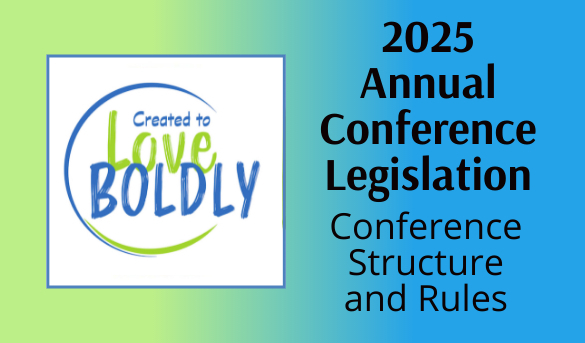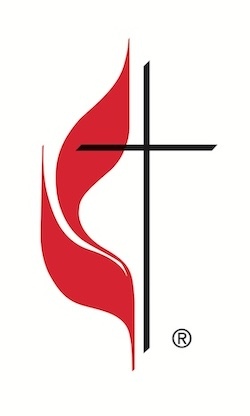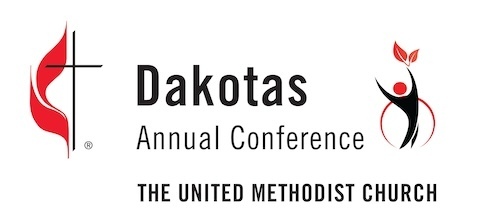
Annual Conference legislation: Conference Structure and Rules update
Over the next several weeks, we will be sharing a series of articles focusing on the legislative items that will be brought to the annual conference session on June 6-8, 2025, in Mitchell, S.D. Clergy and lay members should attend one of the pre-conference webinars to be held on May 27, 29 and June 1 to learn more about the legislation.

On January 1, 2025, The United Methodist Church began a new quadrennium (four-year term), and with that came the publishing of the current Book of Discipline. This book of doctrine and polity includes new legislation that the 2024 General Conference passed, as well as the historical, theological foundations, and call of mission and ministry to all United Methodists.
In order to deepen our Wesleyan Methodist faith and identity and keep them before us in all that we do, portions and references from The Book of Discipline sections on our Doctrinal Heritage and History, our Doctrinal Standards and Theological Task, and the Ministry of All Christians, as well as the Foundational Scriptures that guide our conference, have been added to our conference Rules and Policies (which can be found in the back of the Conference Journal.
Additionally, over the past several years, we have changed staffing titles, job descriptions, and positions. That section of the Rules and Policies has been updated to reflect that.
Title: Additions and corrections to our Conference Structure and Rules of Order
Information submitted and affirmed by: Dakotas Conference Appointive Cabinet members (Rev. Dan Bader, Rev. Kris Mutzenberger, Rev. Joel Winckler, Rev. Brandon Vetter)
Action: Add Sections 1.1.1 – 1.1.6 and 1.3.1; Replace “1.4 Viability of the Local Church” with “1.4 The Local Church”; Replace “Executive Director of Ministries” with “Assistant to the Bishop for Connection and Communications” and replace “district superintendents” with “conference superintendents; Remove 4.4.; Add role descriptions and clarifications.
Rationale: In order to deepen our Wesleyan Methodist faith and identity and keep them before us in all that we do, these sections on our Doctrinal Heritage and History, our Doctrinal Standards and Theological Task, and the Ministry of All Christians—summaries from the corresponding paragraphs in The Book of Discipline—as well as the Foundational Scriptures that guide our conference have been added to Section 1: Mission of the Annual Conference. A description of how we live out our purpose as an annual conference – by reaching, equipping, aligning, connecting, and heralding – has been added as a sub- section of 1.3 to give clarity and language related to Viability of the Local Church has been replaced with a portion of the Book of Discipline relate to the purpose of the Local Church to reflect our current reality. Finally, updates have been made to job titles, descriptions, and processes in section 2, 4, and 5 to reflect current practices and position.

1.1.1
Our heritage in doctrine and our present theological task focus upon a renewed grasp of the sovereignty of God and of God’s love in Christ amid the continuing crises of human existence.
Our forebears in the faith reaffirmed the ancient Christian message as found in the apostolic witness even as they applied

anew in their own circumstances. Their preaching and teaching were grounded in Scripture, informed by Christian tradition, enlivened in experience, and tested by reason.”
“Their labors inspire and inform our attempts to convey the saving gospel to our world with its needs and aspirations.” (¶102) For more, see ¶102.
1.1.2 Our Doctrinal History. “The pioneers in the traditions that flowed together into The United Methodist Church understood themselves as standing in the central stream of Christian spirituality and doctrine, loyal heirs of the authentic Christian tradition. In John Wesley’s words, theirs was ‘the old religion, the religion of the Bible, the religion . . . of the whole church in the purest ages.’ Their gospel was grounded in the biblical message of God’s self-giving love revealed in Jesus Christ.”
“Wesley’s portrayal of the spiritual pilgrimage in terms of “the scripture way of salvation” provided their model for experiential Christianity. They assumed and insisted upon the integrity of basic Christian truth and emphasized its practical application in the lives of believers.”
“This perspective is apparent in the Wesleyan understanding of ‘catholic spirit.’ While it is true that United Methodists are fixed upon certain religious affirmations, grounded in the gospel and confirmed in their experience, they also recognize the right of Christians to disagree on matters such as forms of worship, structures of church government, modes of baptism, or theological explorations. They believe such differences do not break the bond of fellowship that ties Christians together in Jesus Christ. Wesley’s familiar dictum was, ‘As to all opinions which do not strike at the root of Christianity, we think and let Wesley’s familiar dictum was, ‘As to all opinions which do not strike at the root of Christianity, we think and let think.” (¶103) For more, see ¶103.
1.1.3 Our Doctrinal Standards and Our Theological Task. See ¶104 for our doctrinal standards. “Theology is our effort to reflect upon God’s gracious action in our lives. In response to the love of Christ, we desire to be drawn into a deeper relationship with ‘faith’s pioneer and perfecter.’ Our theological explorations seek to give expression to the mysterious reality of God’s presence, peace, and power in the world. By so doing, we attempt to articulate more clearly our understanding of the divine-human encounter and are thereby more fully prepared to participate in God’s work in the world.”
“The theological task, though related to the Church’s doctrinal expressions, serves a different function. Our doctrinal affirmations assist us in the discernment of Christian truth in ever-changing contexts. Our theological task includes the testingrenewal, elaboration, and application of our doctrinal perspective in carrying out our calling ‘to spread scriptural holiness over these lands.’”
“While the Church considers its doctrinal affirmations a central feature of its identity and restricts official changes to a constitutional process, the Church encourages serious reflection across the theological spectrum.”
“As United Methodists, we are called to identify the needs both of individuals and of society and to address those needs out of the resources of Christian faith in a way that is clear, convincing, and effective. Theology serves the Church by interpreting the world’s needs and challenges to the Church and by interpreting the gospel to the world.”
“The nature of our theological task” is both “critical and constructive,” “individual and communal,” “contextual and incarnational,” and “essentially practical.” Our sources and criteria are “scripture,” “tradition,” “reason,” and “experience.” “Doctrine arises out of the life of the Church—its faith, its worship, its discipline, its conflicts, its challenges from the world it would serve.”
“Evangelism, nurture, and mission require a constant effort to integrate authentic experience, rational thought, and purposeful action with theological integrity. A convincing witness to our Lord and Savior Jesus Christ can contribute to the renewal of our faith, bring persons to that faith, and strengthen the Church as an agent of healing and reconciliation.” (¶105) For more on our theological task, see ¶105
1.1.4 The Ministry of All Christians. “The heart of Christian ministry is Christ’s ministry of outreaching love. Christian ministry is the expression of the mind and mission of Christ by a community of Christians that demonstrates a common life of gratitude and devotion, witness and service, celebration and discipleship. All Christians are called through their baptism to this ministry of servanthood in the world to the glory of God and for human fulfillment. The forms of this ministry are diverse inlocale, in interest, and in denominational accent, yet always catholic in spirit and outreach.”( ¶126) For more, see ¶120-143.
1.1.5 Our Social Principles. We commit to learning and to teaching our Social Principles. “The Social Principles are not church law. Instead, they represent the prayerful and earnest efforts of the General Conference to speak to issues in the contemporary world from a sound biblical and theological foundation that is in keeping with the best of our United Methodist traditions.” (Preface) They speak to the community of all creation, the economic community, the social community, the political community and our social creed. For more, see ¶160-164.
1.1.6 Foundational Scriptures. Every Dakotas United Methodist will live out The Great Commandment (Matthew 22:37- 40), The Great Commission (Matthew 28:18-20), The Great Requirement (Micah 6:8) and The Great Proclamation (Luke 4:18-19).
*****

1.3.1. R.E.A.C.H. Function. We live out our purpose, as defined by ¶601, by working to resource, equip, align, connect and herald what it means to be Christ-followers in the Wesleyan tradition.
*****
1.4 The Local Church. “The local church provides the most significant arena through which disciple-making occurs. It is a community of true believers under the Lordship of Christ. It is the redemptive fellowship in which the Word of God is preached by persons divinely called and the sacraments are duly administered according to Christ’s own appointment. Under the discipline of the Holy Spirit, the church exists for the maintenance of worship, the edification of believers, and the redemption of the world.” (¶201) For more, see ¶202.
*****
2.2. Assistant to the Bishop for Connection and Communications. The Assistant to the Bishop for Connection and Communications is appointed by the Bishop and carries out the duties defined in Section 4.3.2 and duties assigned by the Bishop.
Section 4: Staffing
4.1. Conference Superintendents. The Annual Conference shall have four districts with the district lines and a number of superintendents serving the conference as determined by the Bishop in consultation with the appointive cabinet. (¶415-417)
4.2. Hiring of Staff. The Bishop and the Human Resources Committee shall work together to set up the process for the selection of all staff positions, excluding Assistant to the Bishop for Connection and Communications and the Executive Director of Finance and Administrative Services. Any additional staffing for program and missional priorities may occur in consultation with Human Resources, Conference Council on Finance and Administration, Common Table, and Extended Cabinet.
4.3. Assistant to the Bishop for Connection and Communications
4.3.1 This position shall be selected and supervised by the Bishop in consultation with the Human Resources Committee.
4.3.2 Responsibilities:
a) under the direction of the Bishop, to provide oversight of the annual conference, including supervision and evaluation of the conference program staff, but excluding the Executive Director of Finance and Administrative Services and conference superintendents.
b) to resource conference teams as needed
c) to review and authorize communication of information disseminated on behalf of the Annual Conference.
d) to serve as a non-voting member of the appointive cabinet.
e) to undertake other duties as assigned by the bishop.
f) to serve as the connectional team between the annual conference, general boards and agencies, and the local church.
g) to recruit and work with a Sessions Committee to ensure the organization and logistics of planning the annual conference session
h) to recruit and work with a Committee on Records, Rules, and Procedures
i) to recruit and work with a Committee on Resolutions and General Conference Petitions.
j) to recruit and work with a Journal Editorial Committee
k) To attend to the responsibilities in paragraphs ¶608 & ¶609 and the functions of ¶646
(Remove 4.4 Director of Leadership Development)
Section 5: District Agencies
5.1. District Committee on Ordained Ministry. There shall in each district be a District Committee on Ordained Ministry with functions as specified in ¶666. The Committee shall be constituted as specified in that paragraph and shall consist of a total of seven clergy in full connection (including the chairperson and conference district superintendents) and three professing members of local churches.
5.3. District Board of Church Location and Building. There shall in each district be at least one District Board of Church Location and Building with functions as specified in ¶¶2519-2521. More than one board may be elected in a district for geographic reasons at the discretion of the conference district superintendents. Each board shall be constituted as specified in ¶2519 and consist of six to nine members.